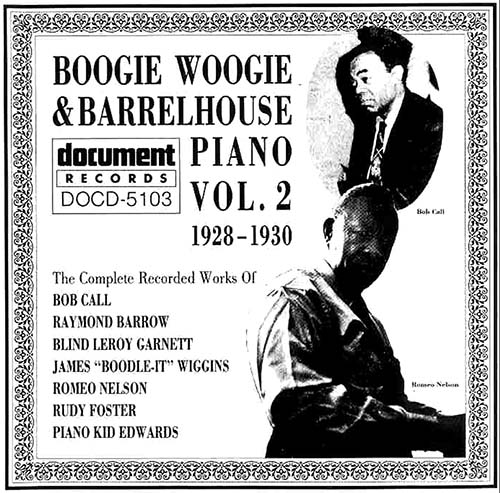
Abridged from this album’s original booklet notes. As a result of his friendship with Tampa Red, Romeo Nelson recorded at a Tampa Red session in 1929. He probably accompanied Tampa on DYING MERCY BLUES and then performed his exciting HEAD RAG HOP, with its rent-party atmosphere, complete with scintillating treble runs over an insistent boogie bass. GETTIN’ DIRTY was a marvelous close cousin to the DOZENS and another obvious rent-party piece.
DYIN’ RIDER, by contrast, was a macabre Blues and 11.29, a jaunty version, oddly, of THE MIDNIGHT SPECIAL. Romeo supported himself by playing piano and gambling until the rent-parties died out; then he settled to a regular job as a janitor and elevator operator for a publisher and even featured in their house journal in 1959!. Rudy Foster is unknown – arguments abound whether he accompanied himself (which seems likely) or whether Charlie Spand played piano for him (most unlikely) or some unknown pianist (not unlikely).
Heavy and inventive, Foster’s are boogies typical of the Northern triangle – Chicago, Detroit, Indianapolis – so could the invitation to “four-five oh-six” on CORN TRIMMER possibly refer to Chicago’s 45th & State or is it too fanciful? Probably. The extremely rare Piano Kid Edwards’s sides could hardly provide a bigger contrast; this explosion of ragtime and stride piano indicates a much earlier style but betrays not the slightest trace of his origins.
In much the same way Blind Leroy Garnett, James Wiggins accompanist on 12th October 1929 at least, belongs to that older school and whilst a brilliant ragtime pianist could hardly be considered a bluesman. Circumstantial evidence, a “Blind Leroy” remembered from Fort Worth or the title LOUISIANA GLIDE, suggests a Texas or Louisiana background. The heavy-voiced Wiggins (thought to be from Dallas) is of interest for the confusion surrounding his accompanists. In a pioneering article (BU 114, 1975) Hall & Noblett analysed his recordings and cast doubts on the accepted identifications. They accept Garnett’s presence on MY LOVIN’ and WEARY HEART but doubt he plays on FORTY-FOUR BLUES.
Similarly they agree Bob Call as pianist on EVIL WOMAN but not necessarily KEEP A-KNOCKIN’. For Wiggins’s last coupling CORINNE CORINNA and GOTTA SHAVE ‘EM DRY, Charlie Spand had been suggested but no firm conclusions were drawn. Bob Call, identified on two unissued Wiggins’s sessions, raises other questions; can the pianist of 31 BLUES be the same Bob Call who after a gap of eighteen years crops up as a band pianist on records by Arbee Stidham, Big Bill Broonzy, Jazz Gillum, Robert Nighthawk and who under his own name made a couple of jump blues? It would seem so.
Call was known to have gone to school to learn to read music, presumably to expand his musical potential and moreover, the age seems right; his photograph from 1958 shows a man well into his fifties. Bob Call was shrewd enough to realise a change in style was necessary – those that wouldn’t change retired or disappeared, and left as few traces as when they arrived. DOCD-5103
Tracklist :
1 "Boodle It" Wiggins– Keep A-Knockin' An' You Can't Get In 3:09
2 "Boodle It" Wiggins– Evil Woman Blues 3:10
3 Bob Call– 31 Blues 2:42
4 Raymond Barrow– Walking Blues 3:08
5 James Wiggins– My Lovin' Blues 2:47
6 James Wiggins– Weary-Heart Blues 2:43
7 Blind Leroy Garnett– Chain 'Em Down 3:05
8 Blind Leroy Garnett– Louisiana Glide 3:11
9 James Wiggins– Forty-Four Blues 3:09
10 James Wiggins– Frisco Bound 3:20
11 Marie Griffin– What Do You Think This Is? 2:37
12 Marie Griffin– Blue And Disgusted 3:00
13 James Wiggins– Corinne Corinna Blues 3:12
14 James Wiggins– Gotta Shave 'Em Dry 3:05
15 Romeo Nelson– Head Rag Hop 3:02
16 Romeo Nelson– Gettin' Dirty Just Shakin' That Thing 2:57
17 Romeo Nelson– Dyin' Rider Blues 3:09
18 Romeo Nelson– 1129 Blues (The Midnight Special) 2:53
19 Rudy Foster– Black Gal Makes Thunder 2:51
20 Rudy Foster– Corn Trimmer Blues 3:00
21 Piano Kid Edwards– Gamblin' Man's Prayer Blues 2:52
22 Piano Kid Edwards– Hard Luck Gamblin' Man 3:05
23 Piano Kid Edwards– Piano Kid Special 2:45
24 Piano Kid Edwards– Give Us Another Jug 2:45
Mostrando postagens com marcador Raymond Barrow. Mostrar todas as postagens
Mostrando postagens com marcador Raymond Barrow. Mostrar todas as postagens
9.2.25
BOOGIE WOOGIE & BARRELHOUSE ★ Piano Volume 2 • 1928-1930 — The Complete Recorded Works of BOB CALL, RAYMOND BARROW, BLIND LEROY GARNETT, JAMES "BOODLE-IT" WIGGINS, ROMEO NELSON, RUDY FOSTER, PIANO KID EDWARDS | DOCD-5103 (1992) RM | FLAC (tracks+.cue), lossless
Assinar:
Comentários (Atom)
+ last month
MARTHA COPELAND — Complete Recorded Works In Chronological Order Volume 2 · 1927-1928 + IRENE SCRUGGS — The Remaining Titles 1926-1930 | DOCD-5373 (1995) FLAC (tracks+.cue), lossless
One of many early blues and jazz women who were overshadowed and ultimately eclipsed by Ma Rainey, Ethel Waters, and Bessie Smith, Martha Co...





.jpg)
.jpg)



